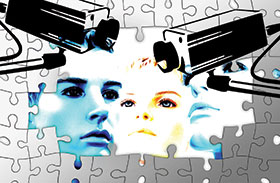

The attacks in Paris on the Bataclan Concert Hall, Stade de France, and several restaurants by ISIS in November and its tragic consequences has highlighted the importance of CCTV in public spaces and terrorism. It also highlights the differences between countries and culture, and their implementation of CCTV. In these and other instances in France, footage displayed on TV was often through cellphone recordings or people using cameras. The absence of quality CCTV footage was surprisingly lacking.
At a SMART (Scalable Measures for Automated Recognition Technologies) conference in 2014 in Australia that was looking at global perspectives on surveillance, I made the point during my presentation that the nature of society shapes the way CCTV is implemented. Even with legislation, the nature of the law, its interpretation and implementation is shaped by social and community issues in different countries.
In South Africa, our crime dynamics typically numb us to the privacy issues and we tend to feel that the more cameras the better. Privacy takes a clear back seat. In Poland on the other hand, I was once asked for some of the qualities that make a good operator. When I replied that one of the qualities was that the person should want to catch people, there were a number of comments that that didn’t necessarily go down in Poland very well. This was because of their communist past and the fact that people were paid or compelled to inform on their family and neighbours and in the new era this was seen as antisocial.
Delegates in the conference from countries like Estonia who had emerged from Russian occupation expressed similar views. Even those from Germany were very uncomfortable with public surveillance and the use of a police vehicle to drive around doing automated number plate recognition to detect criminals was seen as unacceptable. In France, the culture of personal liberty also plays a major part in reducing the level of CCTV implementation.
Social legitimacy and social relevance
CCTV strategies are therefore shaped by social legitimacy and social relevance, social acceptance, and whether it addresses key social issues of concern within communities. Those who are watched will also react in an active way.
While South Africans (particularly those in Gauteng) would see cameras there to protect against crime as a good thing, the systematic resistance of the community to eTolls reflects this social reaction. A country like the UK, on the other hand, has experienced terrorism for a long time, even before the introduction of CCTV became commonplace in city and town centres.
The UK has always followed a fine line between privacy issues and effectiveness, but the spread of cameras has been substantial. Estimates of government giving subsidies for CCTV of approximately £230 million pounds between 1996 and 2003 reflect this focus. As a result, one sees extensive use of CCTV on TV news reports on crime, terrorism, and missing persons – not always good quality, but footage nonetheless.
A further characteristic is that the UK has also been among the first to have police linking private CCTV cameras which may be covering public spaces to a map of total CCTV coverage of areas. It means that if an incident occurs, they can use not only city centre cameras, but those private cameras covering the areas in question. It has led to police being able to follow the routes and actions of criminals surprisingly effectively.
Perth in Western Australia has a similar scheme called Blue Iris, where business operations in Perth are encouraged to provide details of cameras which have public coverage to the Western Australian police. While these systems are only likely to be used for reviewing situations after the fact, if things like standards compatibility and transmission issues are sorted out in the long term, the police would in all likelihood be overjoyed to have the chance to access such an extensive camera system on a live viewing basis.
Application in South Africa
This extended camera mapping also has very useful potential application in South Africa. Already we have footage at places such as garages and toll booths being used in court cases. If broader footage availability around places like shopping centres or other frequently hit targets could be systematically mapped out and managed, the chance for following suspects (even when disguised) and identifying them a number of kilometres from the scene becomes quite feasible.
There are privacy concerns about who has access to this information, and what happens to it afterwards. Also, the potential for disruptions to systems when information is requested too often would need to be considered.
Automated or smart systems also have the potential to tie information together, and not just CCTV information. Automated recognition of individuals and/or pre-determined traits or risk factors/criteria lies at the basis of smart surveillance systems. Yet at the conference it was highlighted that new EU regulations, and specifically those on information sharing between police and security forces, explicitly prohibit automated decision-taking regarding individuals unless “authorised by a law which also lays down measures to safeguard the data subject’s legitimate interests.”
The PoPI legislation in South Africa has made extensive use of the legal and human rights concepts in the EU and the UK in its formulation.
It means that we are going to need to be cognisant of these kinds of issues including how video analytics impacts on privacy. However, the UK has demonstrated how CCTV can be implemented extensively in conjunction with human rights. Like France, we are going to have to work out a CCTV strategy that works and protects us, and reconciles the rights of privacy at the same time.

© Technews Publishing (Pty) Ltd. | All Rights Reserved.